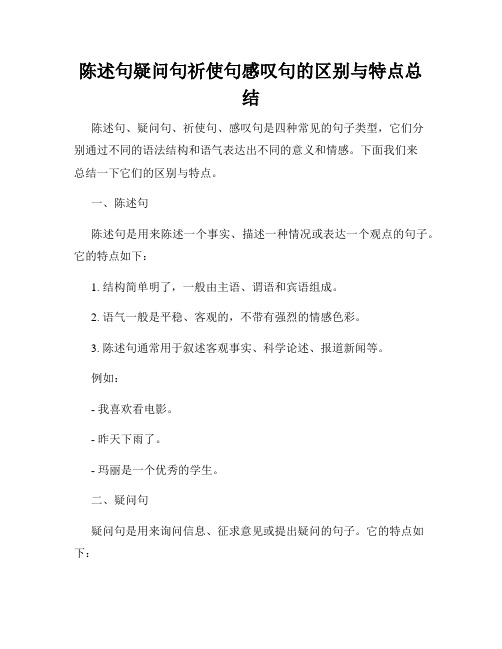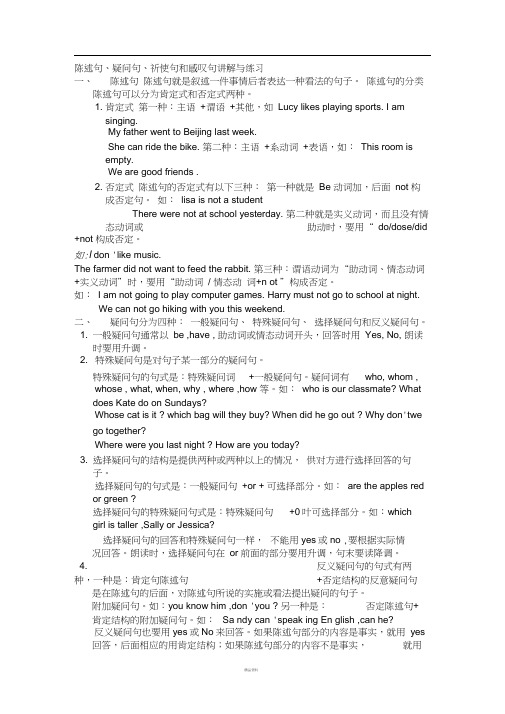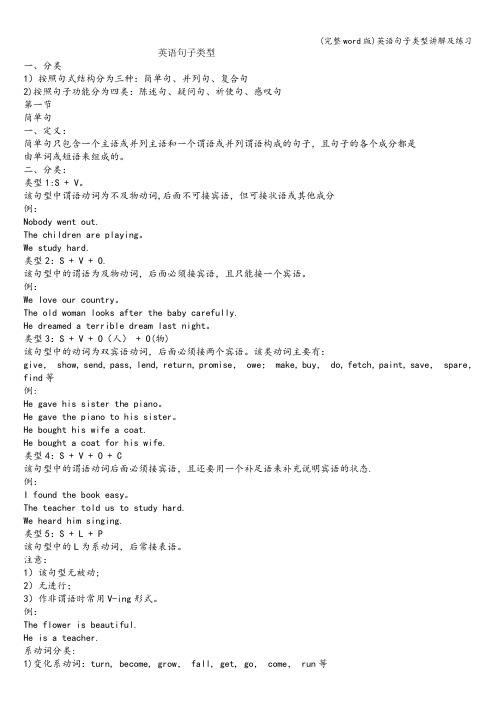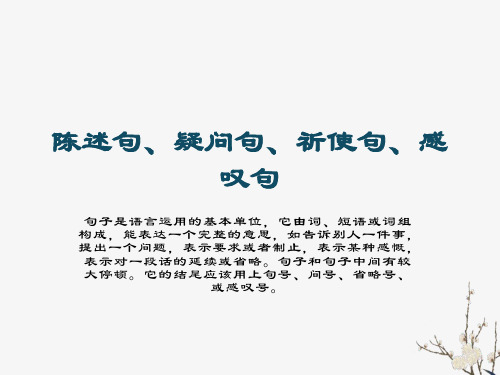陈述句、疑问句、祈使句和感叹句讲解与练习
如何讲解语文句式题

如何讲解语文句式题一、句式种类介绍在语文学习中,句式是一个重要的知识点。
不同的句式有着不同的表达效果和用途。
常见的句式有陈述句、疑问句、祈使句和感叹句。
除此之外,还有一些特殊的句式,如被动句、倒装句、省略句等。
了解这些句式的特点,有助于我们更好地理解和运用语言。
二、判断句解析判断句是表达事物或人之间的逻辑关系的句子。
判断句通常包含判断词,如“是”、“为”、“乃”等,用来表示主语和谓语之间的关系。
在判断句中,要注意判断词的位置和用法,以及判断的对象是否明确。
三、被动句识别被动句是指句子中的主语是动作的接受者,而不是动作的发出者。
被动句通常使用被动词,如“被”、“受”、“由”等。
在被动句中,要注意被动词的位置和用法,以及动作的接受者和发出者之间的关系。
四、省略句理解省略句是指在句子中省略了一些词语,使得句子结构不完整。
省略句通常出现在口语或诗歌中,用来表达简洁明快的效果。
在理解省略句时,要根据上下文语境和语法结构,判断省略了哪些词语,以及省略后对句子意义的影响。
五、倒装句特点倒装句是指句子中的词语顺序颠倒,不符合正常的语法规则。
倒装句通常是为了强调某些词语或表达某种特殊效果。
常见的倒装句有主谓倒装、宾语前置、定语后置等。
在理解倒装句时,要注意词语的顺序和语法结构,以及倒装的原因和效果。
六、祈使句与感叹句辨析祈使句是指表示请求、命令或禁止的句子,通常以动词原形开头,表示第二人称。
感叹句是指表示感叹、惊奇、愤怒等强烈情感的句子,通常以形容词或副词开头,表示第一人称或第二人称。
在辨析祈使句与感叹句时,要注意语气和情感色彩,以及句子结构和表达方式。
七、长句与短句变换长句是指结构复杂、词语较多的句子;短句是指结构简单、词语较少的句子。
长句和短句各有特点:长句能够表达复杂的思想和严密的结构;短句能够表达简洁明快的语感和强烈的节奏感。
在实际应用中,可以根据需要将长句转化为短句或将短句转化为长句。
在进行变换时,要注意保持原意不变和语言流畅性。
综合练习:四种句子【陈述句+疑问句+祈使句+感叹句】(附超详细解析)

四种句子练习:陈述句+疑问句+祈使句+感叹句(附超详细解析)一、单项选择1.I’ve never seen anyone run so fast—______David go.A.just watchB.just to watchC.just watchingD.just having watched2.—English has large vocabulary,hasn't it?—Yes,_________more words and expressions and you will find it easier to read and communicate.A.KnowB.KnowingC.To knowD.Known3.—Sorry,Joe,I didn’t mean to…—Don’t call me“Joe”.I’m Mr Parker to you,and you forget it!A.doB.didn’tC.didD.don’t4._____it with me and I'll see what I can do.A.When leftB.LeavingC.If you leaveD.Leave5.-Alice,you feed the bird today,______?-But I fed it yesterday.A.do youB.will youC.didn't youD.don't you6.She never tells a lie,_______?A.does sheB.doesn't sheC.does not sheD.isn't it7.She hardly ever speaks to you in English,_______?A.does sheB.doesn't sheC.can sheD.can't she8.It's a fine day. Let’s go fishing,________?A.won't weB.will weC.don't weD.shall we9.Don’t smoke in the meeting room,_________?A.do youB.will youC.can youD.could you10.Be sure to write to us,________?A.will youB.aren't youC.can youD.mustn't you11.—You haven’t been to Beijing,have you?—_____.How I wish to go there!A.Yes,I haveB.Yes,I haven’tC.No,I haveD.No,I haven’t12.Susan's found her pass,_______?A.isn't sheB.is sheC.hasn't sheD.was she13.I don't think you've heard of him before,_______?A.have youB.haven't youC.do ID.don't you14.He seldom has lunch at school,_______?A.hasn’t heB.has heC.doesn’t heD.does he15.He is expected to make a speech this afternoon,_______?A.is he notB.isn't heC.is not heD.isn't it16.His wife had the front door painted green yesterday,_______she?A.didB.hadC.didn'tD.hadn't17.I don’t suppose anyone will volunteer,_______?A.do IB.don’t IC.will theyD.won’t they18.If I knew the answer,I wouldn't be working,________?A.didn't IB.did IC.would ID.wouldn't I19.The news that they failed their driving test discouraged him,_______?A.did theyB.didn’t theyC.did itD.didn’t it20._______some of this juice—perhaps Gen’ll like it.A.TryingB.TryC.To tryD.Have tried21.______at the door before entering,please.A.KnockedB.To knockC.KnockingD.Knock22._______!There is a train coming.A.Look outB.Look aroundC.Look forwardD.Look at23.________we have today!A.A fine weatherB.What a fine weatherC.How a fine weatherD.What fine weather24.Oh,John._________you gave us!(1990)A.How a pleasant surpriseB.How pleasant surpriseC.What a pleasant surpriseD.What pleasant surprise25._________food you’ve cooked!A.How a niceB.What a niceC.How niceD.What nice26._______terrible weather we’ve been having these days!A.How aB.What aC.HowD.What27.________from Beijing to London!A.How long way it isB.What a long way is itC.How long way is itD.What a long way it is28.—Please don’t make a noise.—_________.A.I don’tB.I won’tC.No,I won’tD.Yes,I will29.He little realized that he made a big mistake,_________?A.didn't heB.hadn't heC.had heD.did he30.—Your father told me that he overslept this morning.—Oh, my father rarely used to oversleep,_________?A.wasn'tB.was heC.didn't heD.did he二、答案与解析1.【答案】A【句意】我从没看到有人跑这么快,看看大卫跑的。
陈述句疑问句祈使句感叹句的区别与特点总结

陈述句疑问句祈使句感叹句的区别与特点总结陈述句、疑问句、祈使句、感叹句是四种常见的句子类型,它们分别通过不同的语法结构和语气表达出不同的意义和情感。
下面我们来总结一下它们的区别与特点。
一、陈述句陈述句是用来陈述一个事实、描述一种情况或表达一个观点的句子。
它的特点如下:1. 结构简单明了,一般由主语、谓语和宾语组成。
2. 语气一般是平稳、客观的,不带有强烈的情感色彩。
3. 陈述句通常用于叙述客观事实、科学论述、报道新闻等。
例如:- 我喜欢看电影。
- 昨天下雨了。
- 玛丽是一个优秀的学生。
二、疑问句疑问句是用来询问信息、征求意见或提出疑问的句子。
它的特点如下:1. 结构一般是主谓倒装或在句首加疑问词。
2. 语气是带有疑问或不确定的调子,用于询问对方或者表达自己的疑惑。
3. 疑问句通常用于提问、寻求答案、征询意见等情境中。
例如:- 你喜欢吃水果吗?- 他怎么去的学校?- 你认为这个决定怎样?三、祈使句祈使句是用来表示命令、请求、建议或劝告的句子。
它的特点如下:1. 结构简单,一般只有谓语动词,主语一般省略,称为愿望语气。
2. 语气强烈,带有命令、请求或建议的意味。
3. 祈使句通常用于表达命令、请求、劝告等情境中。
例如:- 快点走!- 请帮我拿个杯子过来。
- 赶快离开这里!四、感叹句感叹句是用来表达强烈的情感或感叹的句子。
它的特点如下:1. 结构多样,可以是陈述句、疑问句或祈使句。
2. 语气强烈,带有强烈的感情色彩,用于表达惊讶、喜悦、伤心等情感。
3. 感叹句通常用于表达强烈的情感或对某种情况的感叹。
例如:- 多么美丽的风景啊!- 天哪,这件事怎么会发生在我身上?- 多么令人振奋的消息!通过对陈述句、疑问句、祈使句、感叹句的区别与特点的总结,我们可以更好地理解它们的使用场景和语法结构,从而在表达时更加准确和恰当。
请根据实际情况灵活运用各种句子类型,丰富你的语言表达能力。
最新 高考英语复习--陈述句、疑问句、祈使句、感叹句

祈使句
类型
肯定句
否定句
Do型
V原型+其他 Listen to me.
Don’t +V原型+其 他
Don’t forget me!
Be型
Be +其他 Be careful! Be 型
Let + sb. +V原型+其他 Let me try again.
Don’t let him go. / Let him not go. Don’t + let + sb. +V原型+其 他 /Let + sb. + not + V原型+其 他
陈述句、疑问句、 祈使句、感叹句
CONTENTS
陈述句
02
疑问句
03
祈使句
04
感叹句
陈述句
DECLARATIVE SENTENCE
陈述句
陈述句用来说明一个事实或表明说话人的看法、态度等。 陈述句句末用句号,一般读降调。 陈述句有肯定和否定两种形式,其一般语序为“主语部分+谓语部分+其他成分”。
b. 带有定语从句,宾语从句的主从复合句,疑问部分 谓语根据主句的谓语而定: He is not the man who gave us a talk, is he?
c. 如果上述部分主句谓语是think, believe, expect, suppose, imagine等,则疑问部分与宾语从句相对应构 成反意疑问句。 I don't think he is bright, is he?
疑问部分用“will you”。
• Go with me, will you / won't you?
陈述句、疑问句、祈使句和感叹句讲解与练习

陈述句、疑问句、祈使句和感叹句讲解与练习一、陈述句陈述句就是叙述一件事情后者表达一种看法的句子。
陈述句的分类陈述句可以分为肯定式和否定式两种。
1. 肯定式第一种:主语+谓语+其他,如Lucy likes playing sports. I amsinging.My father went to Beijing last week.She can ride the bike. 第二种:主语+系动词+表语,如:This room isempty.We are good friends .2. 否定式陈述句的否定式有以下三种:第一种就是Be 动词加,后面not 构成否定句。
如:lisa is not a studentThere were not at school yesterday. 第二种就是实义动词,而且没有情态动词或助动时,要用“ do/dose/did +not 构成否定。
如:I don 'like music.The farmer did not want to feed the rabbit. 第三种:谓语动词为“助动词、情态动词+实义动词”时,要用“助动词/ 情态动词+n ot ”构成否定。
如:I am not going to play computer games. Harry must not go to school at night.We can not go hiking with you this weekend.二、疑问句分为四种:一般疑问句、特殊疑问句、选择疑问句和反义疑问句。
1. 一般疑问句通常以be ,have , 助动词或情态动词开头,回答时用Yes, No, 朗读时要用升调。
2. 特殊疑问句是对句子某一部分的疑问句。
特殊疑问句的句式是:特殊疑问词+一般疑问句。
疑问词有who, whom , whose , what, when, why , where ,how 等。
英语四种基本句型讲解+经典习题(陈述句疑问句祈使句感叹句)

考点一:陈述句【经典习题】1. Grandpa is reading a newspaper now. (改为否定句)Grandpa a newspaper now.2. Li Lin listens to English programmes on the radio. (改为否定句)Li Lin to English programmes on the radio.3. I think you will be a good teacher. (改为否定句)I think you be a good teacher.4. Tom has been to Disneyland in Hong Kong. (改为否定句)Tom to Disneyland in Hong Kong.【考点点拨】陈述句用于陈述一个事实或表明一种看法,包括肯定结构和否定结构两种。
在肯定结构中,谓语动词不含否定词;否定结构在be动词、助动词或情态动词后加not。
除了not外,用其他否定词 (如:no, never, hardly, seldom, little, few, none等)也可以构成否定句。
考点二:疑问句【经典习题】1. Jenny often gets up at five past six. (改为一般疑问句)Jenny often up at five past six?2. That amusement park saw lots of tourists during the holiday. (对划线部分提问)that amusement park see lots of tourists?【考点点拨】疑问句用于提出问题,包括一般疑问句、特殊疑问句、选择疑问句和反意疑问句。
★一般疑问句通常用来询问一件事情是否属实,要求对方用Yes或No回答。
★特殊疑问句是以特殊疑问词开始的以询问信息为目的的疑问句。
(完整word版)英语句子类型讲解及练习

英语句子类型一、分类1)按照句式结构分为三种:简单句、并列句、复合句2)按照句子功能分为四类:陈述句、疑问句、祈使句、感叹句第一节简单句一、定义:简单句只包含一个主语或并列主语和一个谓语或并列谓语构成的句子,且句子的各个成分都是由单词或短语来组成的。
二、分类:类型1:S + V。
该句型中谓语动词为不及物动词,后面不可接宾语,但可接状语或其他成分例:Nobody went out.The children are playing。
We study hard.类型2:S + V + O.该句型中的谓语为及物动词,后面必须接宾语,且只能接一个宾语。
例:We love our country。
The old woman looks after the baby carefully.He dreamed a terrible dream last night。
类型3:S + V + O(人) + O(物)该句型中的动词为双宾语动词,后面必须接两个宾语。
该类动词主要有:give, show, send, pass, lend, return, promise, owe; make, buy, do, fetch, paint, save, spare,find等例:He gave his sister the piano。
He gave the piano to his sister。
He bought his wife a coat.He bought a coat for his wife.类型4:S + V + O + C该句型中的谓语动词后面必须接宾语,且还要用一个补足语来补充说明宾语的状态.例:I found the book easy。
The teacher told us to study hard.We heard him singing.类型5:S + L + P该句型中的L为系动词,后常接表语。
讲解陈述句、疑问句、祈使句、感叹句

二.特指问 用疑问代词(如“谁、什么、怎样”等)和由
它组成的短语(“为什么、什么事、做什么、 怎么做”等)来表明疑问点,说话者希望对方 就疑问点作出答复,句子往往用升调。例如: 二.今天谁值日? 三.你怎么不去图书馆呢? 四.什么事不能好好商量的? 常用语气词“呢、啊”、不用“吗”。
三.选择问
•
陈述句句末可以带上“的、了、呢、罢了”等语气词。“的—了”:
“的”表示本来如此,“了”表示有了变化。“呢—罢了”:同样表示
肯定,但“呢”稍带夸张和强调,而“罢了”却把事情往小里说。
•
陈述句可用肯定形式,也可用否定形式。
•
特点:a、有时可带语气词“了、的、呢、罢了、嘛、啊”等。b、
常用的标点符号:句末用“句号”。
例如: 4. 我不是已经跟你说过了吗?(=不用说了——是非问) 5. 十二点了,怎么还看电视?(=不要看电视了——特指问) 6. 你是来帮我呢,还是来拆台呢?(=老拆台——选择问) 7. 他们这么不讲理你说对不对?(=不对——正反问)
• (三)祈使句要求对方做或不做某事的句子叫祈使句(降 调)。
•
(
)
写出下列句子的名称。
他什么时候走过来了?
(
)
请你把门关上。
(
)
两只黄鹂在树枝上欢快地歌唱。
(
)
阳光下,白雪亮晶晶的,让人睁不开眼。
(
)
弟弟真能干呀!
(
)
难道我说的不对吗?
(
)
这个慈祥、可亲的人是谁呀?
(
)
• 一、句子按语气可分为:
• (一)陈述句:叙述或说明事实的具有陈述语调的句子叫 陈述句。
陈述句、疑问句、祈使句、感 叹句
- 1、下载文档前请自行甄别文档内容的完整性,平台不提供额外的编辑、内容补充、找答案等附加服务。
- 2、"仅部分预览"的文档,不可在线预览部分如存在完整性等问题,可反馈申请退款(可完整预览的文档不适用该条件!)。
- 3、如文档侵犯您的权益,请联系客服反馈,我们会尽快为您处理(人工客服工作时间:9:00-18:30)。
述句、疑问句、祈使句和感叹句讲解与练习一、述句述句就是叙述一件事情后者表达一种看法的句子。
述句的分类述句可以分为肯定式和否定式两种。
1.肯定式第一种:主语+谓语+其他,如Lucy likes playing sports.I am singing.My father went to Beijing last week.She can ride the bike.第二种:主语+系动词+表语,如:This room is empty.We are good friends .2.否定式述句的否定式有以下三种:第一种就是Be动词加,后面not 构成否定句。
如:lisa is not a studentThere were not at school yesterday.第二种就是实义动词,而且没有情态动词或助动时,要用“do/dose/did +not 构成否定。
如:I don’t like music.The farmer did not want to feed the rabbit.第三种:谓语动词为“助动词、情态动词+实义动词”时,要用“助动词/情态动词+not”构成否定。
如:I am not going to play computer games.Harry must not go to school at night.We can not go hiking with you this weekend.二、疑问句分为四种:一般疑问句、特殊疑问句、选择疑问句和反义疑问句。
1.一般疑问句通常以be ,have ,助动词或情态动词开头,回答时用Yes, No, 朗读时要用升调。
2.特殊疑问句是对句子某一部分的疑问句。
特殊疑问句的句式是:特殊疑问词+一般疑问句。
疑问词有who, whom , whose , what, when, why , where ,how 等。
如:who is our classmate? What does Kate do on Sundays?Whose cat is it ? which bag will they buy? When did he go out ? Why don’t we go together?Where were you last night ? How are you today?3.选择疑问句的结构是提供两种或两种以上的情况,供对方进行选择回答的句子。
选择疑问句的句式是:一般疑问句+or +可选择部分。
如:are the apples red or green ?选择疑问句的特殊疑问句式是:特殊疑问句+or+可选择部分。
如:which girl is taller ,Sally or Jessica?选择疑问句的回答和特殊疑问句一样,不能用yes 或no ,要根据实际情况回答。
朗读时,选择疑问句在or 前面的部分要用升调,句末要读降调。
4.反义疑问句的句式有两种,一种是:肯定句述句+否定结构的反意疑问句是在述句的后面,对述句所说的实施或看法提出疑问的句子。
附加疑问句。
如:you know him ,don’t you ? 另一种是:否定述句+肯定结构的附加疑问句。
如:Sandy can’t speaking English ,can he?反义疑问句也要用yes 或No来回答。
如果述句部分的容是事实,就用yes 回答,后面相应的用肯定结构;如果述句部分的容不是事实,就用no 来回答,后面跟否定结构。
在翻译时要注意yes 和no的意思。
如:you know him ,don’t you? Yes ,I do . (是,我认识。
) No,I don’t ( 不,我不认识)Sandy can’t speak English ,can he ? Yes ,he can . (不,他会。
) No,he can’t.(是的,他不会。
)在朗读时,述句部分用降调,附加疑问可以升也可以降。
三、祈使句1.什么是祈使句用来表示请示、命令、劝告、建议等的句子叫做祈使句。
如:Sit down, please.Be careful!2.祈使句的分类根据用途和功能,祈使句可以分为以下几类表请求。
如:Close the window , please.表命令。
如Stop talking!表提醒或警告。
如:Look out !The car is coming.表邀请。
如:Help yourself to some fish.表示禁止。
如:Don’t spit ! No parking!四、感叹句的结构小学阶段的感叹句主要有how 和what 引导两种。
1.How感叹句的结构:how +形容词/副词+主语+谓语,如:how nice the bootsare!2.what 感叹句的结构:What +a/an +形容词+可数名词单数+主语+谓语,如:what a pretty girl she is ! 但是如果是可数名词复数或不可数名词,就可以去掉句中的a/an.如:What expensive pens these are ! What pleasant weather it is!巩固练习基础题( )1. Where is the man?A. Under the treeB. At 10:00C. Read a bookD. My mother ( )2. How do you go to school?A. At 8:00B. IC. TodayD. By bike( )3. What’ he?A. WorkingB. His fatherC. At homeD. A teacher. ( )4. What time do you get up every day?A. At homeB. HeC. Clean my bedroomD. At 7:00 ( )5. What _____ she do this morning?A. isB. doesC. doD. did( )6. How ______ you do?A. areB. isC. doD. did( )7. Which is better, the red one _____ the blue one?A. andB. orC. butD. so( )8. ________ are you?Wonderful!A. HowB. WhatC. WhoD. Where( )9. _________ is it today?It’s Monday.A. What dateB. What dayC. What timeD. What language ( )10. ________ shall we go?In the moring.A. WhenB. WhoC. WhereD. How ( )11. Excuse me ,can you tell me ______ to get to the No. 1 Middle School?A. whereB. whichC. whyD. how( )12.____ got the 100th gold metal in the Olympics for China?- Zhang Yining .A. WhoB. WhatC. WhenD. Where ( )13____ are you talking about?We are talking about the Asia Games in Guangzhou.A. WhatB. WhereC. WhyD. How ( )14.______ do you visit your uncle?- once a week.A. How longB. How manyC. How oftenD. How soon ( ) 15. Excuse me! ________ is the nearest bookshop?Go down the street and turn left at the second corner?A. howB. whatC. whereD. who ( ) 16. ______ is a ticker for the film Hacker He?About forty yuan .A. How oldB. How manyC. How muchD. How often ( ) 17. —______ are you going? —I’m going to the library.A. WhoB. WhichC. WhatD. Where ( )1 8. ______? It’s eight.A. What day is itB. What’s five and threeC. How old are youD. What’s your telephone number ( )1 9. ______ shall we meet in the park?What about half past eight?A. WhatB. WhenC. WhereD. Which( ) 20. ______ a year does your school have sports meetings?Twice a year.A. How oftenB. How soonC. How longD. How many times提高题( )1. ______ are you going to be in the future?I want to be a person _____ Yang Liwei.A. How, likeB. How, asC. What, likeD. What, as ( )2.______ will your father be back? .A. How longB. how oftenC. How soonD. How wide ( )3. ----________sweater is this?----I think it’s Peter’s.A. WhoB. WhatC. WhichD. Whose ( )4. ------_____is the Confucian Temple(孔庙) from here?------It’s about 10 minuters’ walk.A. How manyB. How longC. How muchD. How far ( )5. -----______may I keep these book?-----two weeks.A. How oftenB. How farC. How longD. How soon ( )6. ----______is it from here to Yancheng Railway Station?----About two kilometers.A. How oftenB. How farC. How soonD. How long( )7. ----_______will the foreign students be back from NanJing.----In two days, I think .A. How soonB. How oftenC. How farD. How fast( )8. ----____________?---The one behind the tree.A. Whose girlB. Who’s that girlC. Which girlD. Where’s the girl( )9. ______the population of china?A. How manyB. WhatC. How’sD. What’s ( )10. _______ is she?A. WhomB. WhoC. WhichD. When ( )11. ________ is the best, Tom, Jack or Tim?A. WhichB. WhoC. WhomD. What( )12 ._______ milk do you need?- Three cups.A. How manyB. How muchC. WhatD. Where ( ) 13. —______? —I’v e got a headache and a cough.A. What’s your trouble?B. What’s wrong with it?C. Can I help you?D. How are you?( ) 14. ______ tea did you have?Two cups.A. How manyB. How muchC. How soonD. Which ( )15. ______?Behind the tree.A. Whose girlB. Who’s that girlC. Which girlD. Where’s the girl( )1. ________ the price of the pen?It’s two yuan.A. WhatB. HowC. what’sD. What’s( )2. Whose room is this?A. HeB. himC. theirsD. they( )3. Where ______ you just now?A. wasB. areC. doD. were( )4. Who ________ best in his class?A. danceB. dancingC. dances D is dance( )5. How many ________ are there?A. peoplesB. peopleC. sheepsD. meat( )6. Could you tell me, how _______ to the bank?A. goB. goesC. wentD. to go( )7. _______ the weather like?A. WhatB. HowC. How’sD. What’s( )8. How much _______ the pen?A. doesB. areC. isD. am( )9. ________ are you going to have dinner tonight?A. WhoB. WhereC. WhenD. What ( )10. ----_________ do you go to Hong Kong?----sorry , I’ve never been there.A. How longB. How oftenC. How farD. How soon 对划线部分提问1. My mother goes to work by bike._______ _______ your mother _______ to work?2. There are six kites in the sky.______ _______ _______ are there in the sky?3. Classes begin at eight.______ _______ _______classes ________?4. It's Sunday today._______ _______ is it today?5. The cats are running up the tree.________ are the cats _________?6. He would like five cakes.________ ________ _______ would he like?7. They play football every Friday.________ ________ _______they play football?8. Allan will go back to England by plane next month.______ _______ Allan go back to England next month?9.He often has lunch in the factory._______ _______ he often _______ lunch?10.I got up at six this morning ._______ _______ _______you _______ up this morning ?11.They were drawing a horse when I came in._______ ________ they _______ when I came in ?12. Tom comes from Greece._______ ________ Tom ______ _______?13.I didn't go to school because I had a bad cold.________ ________ you go to school?14.He comes to China once a year.________ ________ ________ he ________ to China?15. Ted put his bag in the desk._____ ______ Ted _____ in the desk?16. He is 12 years old.________ ________ is he?17. I am fine.________ are you?18. They had dinner at home yesterday.________ _______ they ________ dinner yesterday? 19. She is going to be a nurse in the future.__________ is she going to ______in the future?20. It’s ten minutes’ walk from my home to the school.______ _______is it from your home to the school?。
